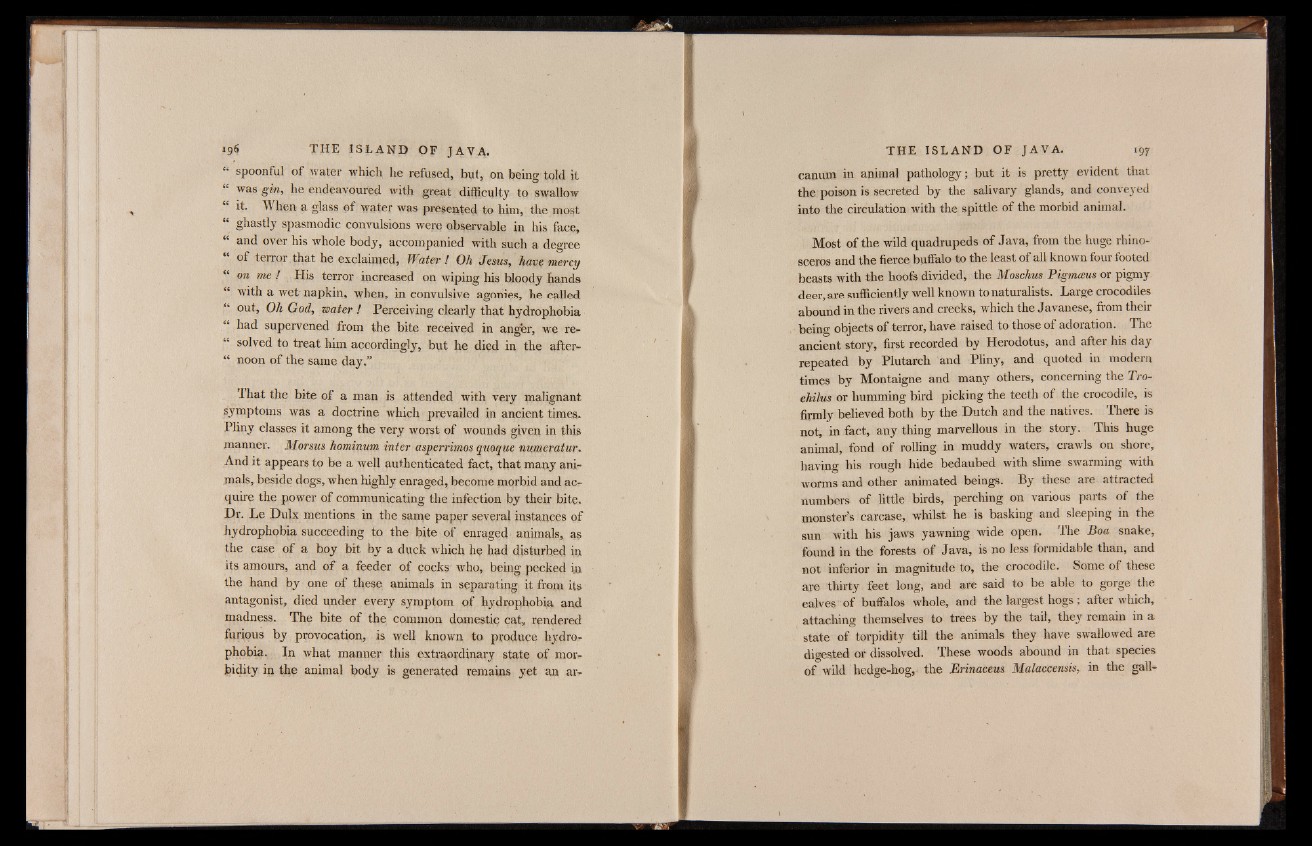
* spoonful of water which he refused, but, on being told it
was gin, he endeavoured with great difficulty to swallow
| it. When a glass of water was presented to him, the most
“ ghastly spasmodic convulsions were observable in his face,
“ and over his whole body, accompanied with such a degree
of terror that he exclaimed, Water ! Oh Jesus, have mercy
on me ! His terror increased on wiping his bloody hands
“ with a wet napkin, when, in convulsive agonies, he called
“ out, Oh God, water ! Perceiving clearly that hydrophobia
“ had supervened from the bite received in anger, we re-
“ solved to treat him accordingly, but he died in the after-
“ noon of the same day.”
That the bite of a man is attended with very malignant
symptoms was a doctrine which prevailed in ancient times.
Pliny classes it among the very worst of wounds given in this
manner. Morsus hominum inter asperrimos quoque numeratur.
And it appears to be a well authenticated fact, that many animals,
beside dogs, when highly enraged, become morbid and acquire
the power of communicating the infection by their bite.
Dr. Le Dulx mentions in the same paper several instances pf
hydrophobia succeeding to the bite of enraged animals, as
the case of a boy bit by a duck which he had disturbed in
its amours, and of a feeder of cocks' who, being pecked hi
the hand by one of these animals in separating it from its
antagonist, died under every symptom of hydrophobia and
madness. The bite of the common domestic cat, rendered
furious by provocation, is well known to. produce hydrophobia.
In what manner this extraordinary state of morbidity
in the animal body is generated remains yet an arcanum
in animal pathology; but it is pretty evident that
the poison is secreted by the salivary glands, and conveyed
into the circulation with the spittle of the morbid animal.
Most of the wild quadrupeds of Java, from the huge rhino-
sceros and the fierce buffalo to the least of all known four footed
beasts with the hoofs divided, the Moschus Pigmceus or pigmy
deer, are sufficiently well known to naturalists. Large crocodiles
abound in the rivers and creeks, which the Javanese, from their
being objects of terror, have raised to those of adoration. The
ancient story, first recorded by Herodotus, and after his day
repeated by Plutarch and Pliny, and quoted in modern
times by Montaigne and many others, concerning the Tro-
chilus or humming bird picking the teeth of the crocodile, is
firmly believed both by the Dutch and the natives. There is
not, in fact, any thing marvellous in the story. This huge
animal, fond of rolling in muddy waters, crawls on shore,
having his rough hide bedaubed with slime swarming with
worms and other animated beings. By these are attracted
numbers of little birds, perching on various parts of the
monster’s carcase, whilst he is basking and sleeping in the
sun with his jaws yawning wide open. The Boa snake,
found in the forests of Java, is no less formidable than, and
not inferior in magnitude to, the crocodile. Some of these
ar© thirty feet long, and are said to be able to gorge the
ealves of buffalos whole, and the largest hogs; after which,
attaching themselves to trees by the tail, they remain in a
state of torpidity till the animals they have swallowed are
digested or dissolved. These woods abound in that species
of wild hedge-hog, the Erinaceus Malaccensis, in the gall